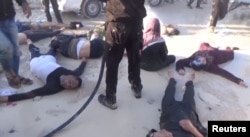U.N. human rights investigators said in a report Wednesday that Syrian government forces were responsible for 20 chemical weapons attacks primarily against civilians during the past four years.
The Independent Commission of Inquiry on Syria said some of those attacks happened between March and July of this year in Khan Sheikhoun, Al-Latamneh and eastern Ghouta. The panel based its findings on interviews with witnesses, victims and medical workers, as well as satellite images, photos of bomb remnants and reports by the Organization for the Prohibition of Chemical Weapons.
President Bashar al-Assad's government has repeatedly denied using chemical weapons.
After the April attack in Khan Sheikhoun, the United States struck Syria's Shayrat Air Base with dozens of Tomahawk cruise missiles.
Beyond the chemical attacks, the U.N. panel said in its report that the overall conflict in Syria is being fought "in blatant violation of basic international humanitarian and human rights law principles, primarily affecting civilians."
It highlighted the use of sieges, which have been employed by Syrian government forces, rebels and Islamic State militants, saying they have " affected civilians more tragically than any other tactic employed by warring parties in the conflict." The commission said right now there are more than 600,000 Syrians living in besieged areas.
The report also said Syrian and/or Russian planes have continued to target hospitals and medical personnel. And it expressed grave concern about the U.S.-led coalition airstrikes and their effects on civilians.
The coalition said last week that between the start of its operations in August 2014 and July of this year "it is more likely than not" that its strikes have unintentionally killed 685 civilians. Watchdog groups such as the organization Airwars put the number much higher, with an estimate of at least 5,000 civilians killed.
The U.N. commission said a U.N.-led peace effort in Geneva and separate talks in Astana, Kazakhstan, involving Iran, Turkey and Russia have made some progress, but that a lack of enforcement or agreements on a political resolution to Syria's conflict limit those gains.
The report reiterated calls for a nationwide cease-fire and for all parties involved to lift sieges and take every step they can to minimize harm to civilians. The panel wants the Syrian government to stop using chemical weapons, and for the international community to take steps to promote accountability for rights abuses by establishing an independent mechanism to prosecute those responsible for such crimes.






